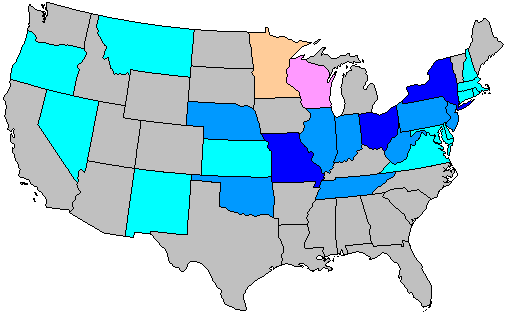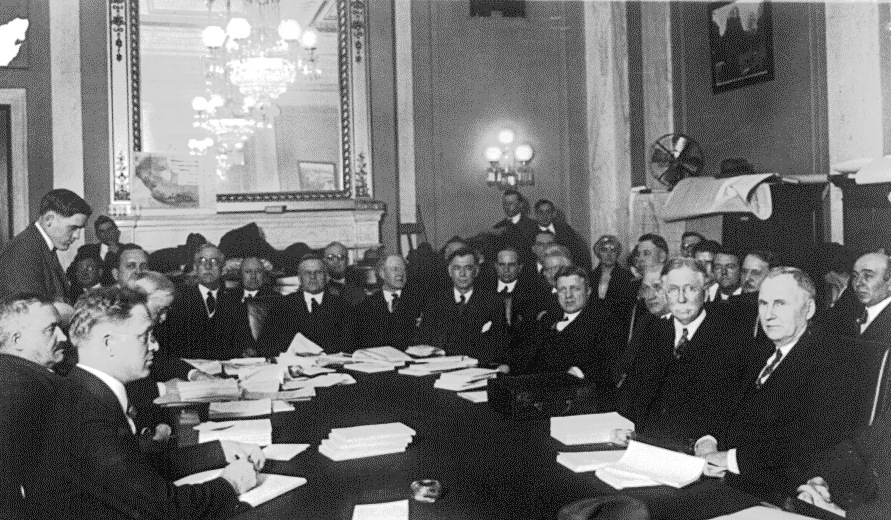|
1922 United States Elections
The 1922 United States elections were held on November 7, 1922. The election took place during Republican President Warren G. Harding's term. The Republican Party lost seats in both chambers of Congress, but retained their majority in the House and Senate. In the House, the Republicans lost seventy-seven seats to the Democratic Party. The Republicans also lost seven seats in the U.S. Senate, six to the Democrats and one to the Minnesota Farmer–Labor Party. The election is notable in that no redistricting occurred despite the completion of the 1920 United States Census, as Congress failed to pass a redistricting bill. This is the only congressional election in which there was no redistricting after a census. The Apportionment Act of 1911 remained in effect until the Reapportionment Act of 1929. The election was a victory for Harding's progressive opponents in the Republican Party, and helped lead to the Teapot Dome investigations and Robert M. La Follette's 1924 third party can ... [...More Info...] [...Related Items...] OR: [Wikipedia] [Google] [Baidu] |
United States Midterm Election
Midterm elections in the United States are the Elections in the United States, general elections that are held near the midpoint of a President of the United States, president's four-year term of office, on Election Day (United States), Election Day on the Tuesday after the first Monday in November. Federal offices that are up for election during the midterms include all 435 seats in the United States House of Representatives, and 33 or 34 of the 100 seats in the United States Senate. In addition, 34 of the 50 U.S. states elect their Governor (United States), governors for four-year terms during midterm elections, while Vermont and New Hampshire elect governors to two-year terms in both midterm and presidential elections. Thus, 36 governors are elected during midterm elections. Many states also elect officers to their State legislature (United States), state legislatures in midterm years. There are also elections held at the municipal level. On the ballot are many mayors, oth ... [...More Info...] [...Related Items...] OR: [Wikipedia] [Google] [Baidu] |
Apportionment Act Of 1911
The Apportionment Act of 1911 (, ) was an apportionment bill passed by the United States Congress on August 8, 1911. The law initially set the number of members of the United States House of Representatives at 433, effective with the 63rd Congress on March 4, 1913.''Apportionment Act of 1911'', , It also included, in section 2, a provision to add an additional seat for each of the anticipated new states of Arizona and New Mexico (which happened in 1912), bringing the total number of seats to 435. Previous apportionment To give effect to the requirements of Article One, Section 2, Clause 3 of the United States Constitution and Section Two of the Fourteenth Amendment that United States representatives be apportioned to the states in proportion to their respective populations, Congress would pass Apportionment Acts following each Census, starting with the Apportionment Act of 1792. Prior to the Apportionment Act of 1911, the Hamilton/ Vinton ( largest remainder) method was used ... [...More Info...] [...Related Items...] OR: [Wikipedia] [Google] [Baidu] |
General Elections In The United States
A general officer is an officer of high rank in the armies, and in some nations' air forces, space forces, and marines or naval infantry. In some usages the term "general officer" refers to a rank above colonel."general, adj. and n.". OED Online. March 2021. Oxford University Press. https://www.oed.com/view/Entry/77489?rskey=dCKrg4&result=1 (accessed May 11, 2021) The term ''general'' is used in two ways: as the generic title for all grades of general officer and as a specific rank. It originates in the 16th century, as a shortening of ''captain general'', which rank was taken from Middle French ''capitaine général''. The adjective ''general'' had been affixed to officer designations since the late medieval period to indicate relative superiority or an extended jurisdiction. Today, the title of ''general'' is known in some countries as a four-star rank. However, different countries use different systems of stars or other insignia for senior ranks. It has a NATO rank sc ... [...More Info...] [...Related Items...] OR: [Wikipedia] [Google] [Baidu] |
1922 Elections In The United States
Nineteen or 19 may refer to: * 19 (number), the natural number following 18 and preceding 20 * one of the years 19 BC, AD 19, 1919, 2019 Films * ''19'' (film), a 2001 Japanese film * ''Nineteen'' (film), a 1987 science fiction film Music * 19 (band), a Japanese pop music duo Albums * ''19'' (Adele album), 2008 * ''19'', a 2003 album by Alsou * ''19'', a 2006 album by Evan Yo * ''19'', a 2018 album by MHD * ''19'', one half of the double album ''63/19'' by Kool A.D. * ''Number Nineteen'', a 1971 album by American jazz pianist Mal Waldron * ''XIX'' (EP), a 2019 EP by 1the9 Songs * "19" (song), a 1985 song by British musician Paul Hardcastle. * "Nineteen", a song by Bad4Good from the 1992 album '' Refugee'' * "Nineteen", a song by Karma to Burn from the 2001 album ''Almost Heathen''. * "Nineteen" (song), a 2007 song by American singer Billy Ray Cyrus. * "Nineteen", a song by Tegan and Sara from the 2007 album '' The Con''. * "XIX" (song), a 2014 song by Slipknot. ... [...More Info...] [...Related Items...] OR: [Wikipedia] [Google] [Baidu] |
1922 United States Gubernatorial Elections
United States gubernatorial elections were held in 1922, in 33 states, concurrent with the House A house is a single-unit residential building. It may range in complexity from a rudimentary hut to a complex structure of wood, masonry, concrete or other material, outfitted with plumbing, electrical, and heating, ventilation, and air condi ... and Senate elections, on November 7, 1922 (October 3 in Arkansas, and September 11 in Maine). Results See also * 1922 United States elections ** 1922 United States Senate elections ** 1922 United States House of Representatives elections References Notes {{United States gubernatorial elections November 1922 events ... [...More Info...] [...Related Items...] OR: [Wikipedia] [Google] [Baidu] |
1922 United States Senate Elections
The 1922 United States Senate elections were elections that occurred in the middle of Republican President Warren G. Harding's term. With the Republicans divided between conservative and progressive factions, the Democrats gained six net seats from the Republicans while the Farmer–Labor party gained one. The Republicans retained their Senate majority. Gains and losses Republicans gained two seats, defeating incumbent Democrats Gilbert M. Hitchcock (Nebraska) and Atlee Pomerene (Ohio). Democrats took one open seat in Indiana and defeated seven Republican incumbents: * T. Coleman du Pont (Delaware) * Joseph I. France (Maryland) * Charles E. Townsend (Michigan) * Joseph S. Frelinghuysen (New Jersey) * William M. Calder (New York) * Miles Poindexter (Washington) * Howard Sutherland (West Virginia) In Minnesota, the Farmer–Labor Party gained its first U.S. Senator, when Henrik Shipstead defeated incumbent Republican Frank B. Kellogg. Change in composition Before the ... [...More Info...] [...Related Items...] OR: [Wikipedia] [Google] [Baidu] |
1922 United States House Of Representatives Elections
The 1922 United States House of Representatives elections were held for the United States House of Representatives in November 1922, in the middle of President Warren G. Harding's term. Just as voters had expressed their distrust of Wilson in 1920, now voters had a chance to express the widespread feeling that Congress had failed to address economic problems, especially the brief but sharp economic recession of 1921–1922. Most of the seats that Republicans lost had long been held by Democrats, who now returned with an even stronger base in the major cities. The Republican Party lost a net of 77 seats to the opposition Democratic Party. The Republicans were neither unified nor well led, and they could boast of very few successes except tax cuts for the wealthy and for corporations, and higher tariffs that pleased manufacturing interest but raised consumer prices. With Senator Bob La Follette as their unofficial leader, some progressives formed a small but highly vocal group o ... [...More Info...] [...Related Items...] OR: [Wikipedia] [Google] [Baidu] |
Robert M
The name Robert is an ancient Germanic given name, from Proto-Germanic "fame" and "bright" (''Hrōþiberhtaz''). Compare Old Dutch ''Robrecht'' and Old High German ''Hrodebert'' (a compound of '' Hruod'' ( non, Hróðr) "fame, glory, honour, praise, renown" and ''berht'' "bright, light, shining"). It is the second most frequently used given name of ancient Germanic origin. It is also in use as a surname. Another commonly used form of the name is Rupert. After becoming widely used in Continental Europe it entered England in its Old French form ''Robert'', where an Old English cognate form (''Hrēodbēorht'', ''Hrodberht'', ''Hrēodbēorð'', ''Hrœdbœrð'', ''Hrœdberð'', ''Hrōðberχtŕ'') had existed before the Norman Conquest. The feminine version is Roberta. The Italian, Portuguese, and Spanish form is Roberto. Robert is also a common name in many Germanic languages, including English, German, Dutch, Norwegian, Swedish, Scots, Danish, and Icelandic. It can be use ... [...More Info...] [...Related Items...] OR: [Wikipedia] [Google] [Baidu] |
Teapot Dome Scandal
The Teapot Dome scandal was a bribery scandal involving the administration of United States President Warren G. Harding from 1921 to 1923. Secretary of the Interior Albert Bacon Fall had leased Navy petroleum reserves at Teapot Dome in Wyoming, as well as two locations in California, to private oil companies at low rates without competitive bidding. The leases were the subject of a seminal investigation by Senator Thomas J. Walsh. Convicted of accepting bribes from the oil companies, Fall became the first presidential cabinet member to go to prison; no one was convicted of paying the bribes. Before the Watergate scandal, Teapot Dome was regarded as the "greatest and most sensational scandal in the history of American politics". It irrevocably damaged the reputation of the Harding administration, which was already severely diminished by its controversial handling of the Great Railroad Strike of 1922 and Harding's veto of the Bonus Bill in 1922. Congress subsequently passed ... [...More Info...] [...Related Items...] OR: [Wikipedia] [Google] [Baidu] |
Progressivism In The United States
Progressivism in the United States is a political philosophy and reform movement in the United States advocating for policies that are generally considered left-wing, left-wing populist, libertarian socialist, social democratic, and environmentalist. In mainstream American politics, progressives generally advocate for a universal healthcare system, wage equity and labor rights, economic justice, social justice, opposition to the military-industrial complex, corporate regulation, the abolition of capital punishment, and action on climate change. It reached its height early in the 20th century. Middle class and reformist in nature, it arose as a response to the vast changes brought by modernization such as the growth of large corporations, pollution and corruption in American politics. Historian Alonzo Hamby describes American progressivism as a "political movement that addresses ideas, impulses, and issues stemming from modernization of American society. Emerging at the end of t ... [...More Info...] [...Related Items...] OR: [Wikipedia] [Google] [Baidu] |
Reapportionment Act Of 1929
The Reapportionment Act of 1929 (ch. 28, , ), also known as the Permanent Apportionment Act of 1929, is a combined census and apportionment bill enacted on June 18, 1929, that establishes a permanent method for apportioning a constant 435 seats in the U.S. House of Representatives according to each census. This reapportionment was preceded by the Apportionment Act of 1911 and took effect after the 1932 election meaning that the House was never reapportioned as a result of the 1920 United States Census. Representation in the lower chamber remained frozen for twenty years. The 1929 Act was the culmination of nearly a decade of debate and gridlock that followed the 1920 Census. However, unlike earlier Apportionment Acts, the 1929 Act neither repealed nor restated the requirements of the previous apportionment acts that congressional districts be contiguous, compact, and equally populated. It was not clear whether these requirements were still in effect until in 1932 the Supreme ... [...More Info...] [...Related Items...] OR: [Wikipedia] [Google] [Baidu] |




